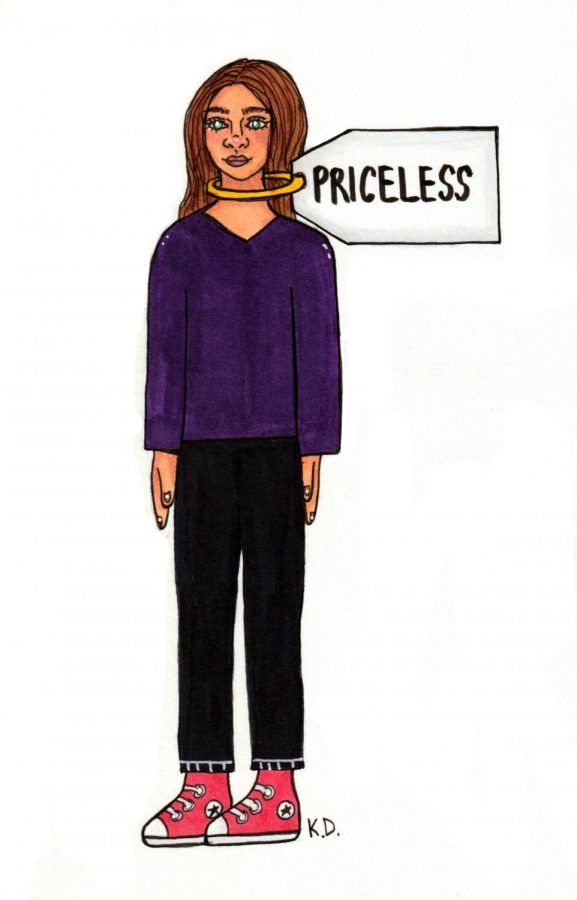Don’t Put a Price Tag on Life
Human lives are more important than money, pandemic or not.
May 10, 2020
There are about 330 million people living in the United States. With the alarmingly rapid spread of COVID-19, public health officials warn that this number will soon drop by 100,000 — at least. Parent, spouse, partner, cousin, sibling, child, mentor, friend, neighbor, colleague, classmate, stranger: we’re all at risk.
“I mean, we’re gonna have millions of cases,” stated Dr. Anthony Fauci, director of the National Institute of Allergy and Infectious Diseases, after urging the federal government to continue promoting social distancing until coronavirus testing becomes more available and efficient. Much to the dismay of many economists and elected public officials — President Donald Trump included — these cautionary and necessary measures include halting most economic activity until further notice.
“WE CANNOT LET THE CURE BE WORSE THAN THE PROBLEM ITSELF,” Trump tweeted a few days before expressing hopes to reopen the economy by Easter (April 12). Whether he intended to or not, Trump publicly implied that saving lives is not worth an economic downturn. Though he soon backtracked and extended social distancing guidelines through April 30, the instantaneous uproar could not be silenced: In what world, capitalist or not, is saving lives the issue while letting people die is the solution?
This misguided and out-of-touch view on the coronavirus pandemic has already backfired in numerous places, leading to tragic casualties that could have been avoided. Countries eager to protect their economies, such as Taiwan and Singapore, are facing second waves of the outbreak after prematurely relaxing economic restrictions. In the United States, health experts warn that a similarly hasty move to restart the economy will have disastrous consequences. Even so, there are many Americans who — in a sort of modern-day return to human sacrifice and a survival-of-the-fittest ideology — promote the idea that some people should die for the sake of others.
In a televised interview, Dan Patrick, the 70-year-old Lieutenant Governor of Texas, ranted: “No one reached out to me and said, ‘As a senior citizen, are you willing to take a chance on your survival in exchange for keeping the America that all America loves for your children and grandchildren?’ And if that’s the exchange, I’m all in.” He went on to claim that “lots of grandparents out there in this country” like him would sacrifice themselves for the supposed benefit of younger generations, falsely suggesting COVID-19 would only jeopardize the elderly if social distancing measures were dropped and the economy were reopened.
The problem is that senior citizens aren’t the only ones who are in serious danger of COVID-19. Millions of other Americans with pre-existing health issues like heart or autoimmune diseases face the same risks, and many of them are young — children, even — with full lives ahead of them. According to the Centers for Disease Control and Prevention, “People of any age who have serious underlying medical conditions might be at higher risk for severe illness from COVID-19.”
Insinuating that the elderly, immunocompromised or diabetic should sacrifice themselves for the sake of the economy perpetuates the outdated idea that some of our fellow human beings are disposable while others are worth saving.
Some economists claim that saving these lives will be a trade-off with those lost due to the consequences of a recession: overdoses, suicides and other deaths stemming from despair, loneliness and poverty. However, when looking at numbers on a page, these people fail to recognize that coronavirus deaths may have similar repercussions; it is paramount not only to weigh the lasting effects of a recession but also to consider the tremendous toll the virus takes on non-economic matters.
Despair and hardships are not only caused by unemployment but also by the unbearable loss of loved ones, the mounting emotional trauma faced by healthcare workers — who now witness death on what seems to be an hourly basis — and the other human tragedies brought about by this pandemic. So even if people were ready to lay down their lives for the sake of America, like Patrick claimed, would it be the right decision? Would their loved ones let them? A singular death can wound a family beyond repair, shatter an entire community or even move a country to action; statistics and percentages can in no way take into account the value of a life.
Besides, the situation may not be as all-or-nothing as some have suggested. When it comes down to saving lives and having a working, secure economy, “you can do both,” assured New York Governor Andrew Cuomo, just “not in a clumsy, ham-handed way” that involves sacrificing vulnerable Americans.
There is a similar consensus among leaders, especially state governors, on both sides of the aisle. “We are going to get our economy back, but we have to get through it, protect as many lives as we can, and then move forward,” tweeted Mike DeWine, Ohio’s Republican Governor.
It’s true that Americans are going to restart the economy; even the most pessimistic projections show that the aftermath of the coronavirus recession will likely not surpass the lows of the Great Depression. Unlike before, the economy pre-coronavirus was stable before it suddenly and forcibly came to a stop, suggesting that consumer demand will once again be up and running after the overwhelming threat of COVID-19 passes. People will start traveling, shopping, going to restaurants and restimulating the economy, even if they’re still wearing masks.
Immediately or not, the economy can be resurrected. The same cannot be said about the thousands left dead.
“My mother is not expendable, and your mother is not expendable and our brothers and sisters are not expendable,” Cuomo asserted. “We’re not going to accept the premise that human life is disposable, and we’re not gonna put a dollar figure on human life.”












